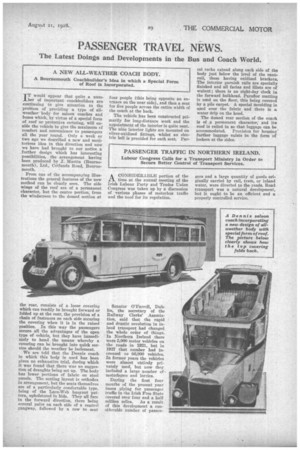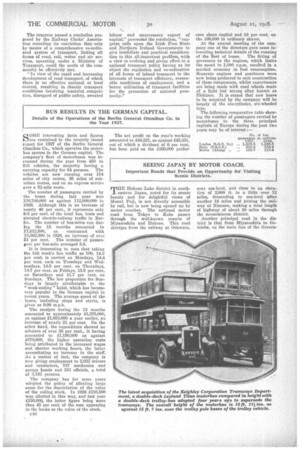PASSENGER TRAFFIC IN NORTHERN IRELAND.
Page 29

Page 30

If you've noticed an error in this article please click here to report it so we can fix it.
Labour Congress Calls for a Transport Ministry in Order to Secure Better Control of Transport Services.
A CONSIDERABLE portion of the /-1 time at the annual meeting of the Irish Labour Party and Trades Union Congress was taken up by a discussion of various phases of motorbus traffic and the need for its regulation.
Senator O'Farrell, Dublin, the secretary of the Railway Clerks' Association, said that the rapid and drastic revolution in inland transport had changed the whole order of things. In Northern Ireland there were 5,000 motor vehicles on the roads in 1921, but in 1927 that number had increased to 56,000 vehicles. In former years the vehicles were almost entirely privately used, but now they included a large number ofmotorbuses and lorries.
During the first four months of the present year buses plying for passenger traffic in lb:Irish Free State covered over four and a half million miles. As a result of this development a considerable number of passen gers and a large quantity of goods originally carried by rail, tram, or inland water, were diverted to the roads. Road transport was a natural development, but it ought to be an efficient and a properly controlled service. The congress passed a resolution proposed by the Railway Clerks' Association recording its conviction that -only by means of a comprehensive co-brdinated system of transport, linking all forms of road, rail, wdter and air services, operating under a Ministry of Transport, could the needs of the community be effectively met.
"In view of the rapid and increasing development of road transport, of which there is no effective national Or )0Cal control, resulting in chaotic transport conditions involving wasteful competition, disregard of public safety, sweated labour and unnecessary export of capital," proceeded the resolution, "eongrass calls upon the Irish Free State and Northern Ireland. Governments to give immediate and practical consideration to this all-important problem, with a view to evolving and giving effect to a national transport policy having as its object the regulation and co-ordination of all forms of inland transport in the interests of transport efficiency, reasonable conditions of employment, and a better utilization of transport facilities for the promotion of national prosperity."


































